Serendip is an independent site partnering with faculty at multiple colleges and universities around the world. Happy exploring!
Brain, Education, and Inquiry - Fall, 2010: Session 9

Session 9
Braiding three lines of inquiry
- our own experiences of education in relation to other peoples'
- doing our own experiment in co-constructive inquiry
- exploring usefulness of insights from studies of brain for thinking about education
Class is itself an experiment in a particular form of education: co-constructive inquiry
Learning by interacting, sharing observations and understandings to create, individually and collectively, new understandings and new questions that motivate new observations
Depends on co-constructive dialogue, being comfortable sharing existing understandings, both conscious and unconscious, in order to use them to construct new ones. Need diversity of understandings, need to be able to both speak and listen without fear of judgment. Need to see both self and others as always in process, always evolving
Sign up to try facilitating co-constructive inquiry yourself, individually or in small groups. Email me with names/topic/date preferred. Something on how something about brain does (or doesn't) help think about education. Paper on this topic due 1 November - November 8.
Continuing from where we are: from last weeks forum
Do people need an overarching truth, even if artificially created (since there is no truth), or do they simply want one in order to organize their lives? ... Evren
So I think I'm the one who has to take responsibility for the introduction of the insipidly mission-statementy phrase "boldness and vision" into our class bank of generally desirable things ... But I'm happy to report that I think I'm beginning to see the fuzzy outlines of its possibility. "Local truths." Something clicked there for me tonight. Freeing ourselves of assumptions about there being a Truth really does mean escaping a kind of tyranny, escaping from a scenario in which we're always bound to fail, because we're aiming at acheiving the impossible. Well, not that we don't stop failing to achieve Truth, but we can "Try again. Fail again. Fail better" (Beckett). Failing better, I'd say, we can equate with local truth. And you can call it better failure if you're in that kind of mood, or you can call it finite success ... We're not "failures" because we're limited. The limitation is the one thing that can't be otherwise. And it's actually where the opportunity for "vision" comes from ... We can't have access to the vista afforded some imagined, omniscient outsider. But every possible ground level angle of appraisal, every real person sized chunk of surveyable landscape is still potentially available to us. Just not all at once. Still looking for boldness... but maybe boldness ought to be replaced by simple curiosity, the curiosity that encourages you to creep forward, allowing your horizon to, bit by bit, expand, and expand, and expand ... jessicarizzo
For each person, education should put them in a position to succeed, and also to feel comfortable choosing a definition of success independently. The idea of absolute truth is a spectrum, and when we go too far towards convincing ourselves and others that there is absolute truth, we are also inhibiting and impinging on divergent thoughts that continually enrich our lives ... FinnWing
Respecting their voices through listening and giving value to their stories will build the foundation for these children to become adults who are able to express themselves clearly and succinctly to convey information as well as to critically assess other information that they encounter in the world ... Angela DiGioia
What stuck out to me from last class was the idea that it might be better to teach to students' cognitive unconscious rather than their conscious. If we look at that idea in along side the idea that the cognitive unconscious does not know "truths" and has no concept of the truth, then these two ideas together seem to be saying that in teaching to a student's cognitive unconscious, teachers would not be teaching truths. Instead, teachers would be teaching to a system devoid of truths .... I do wonder though if it is entirely possible to teach entirely the cognitive unconscious and how such activities would be structured ... ln0691
Teaching children to really think about everything that is told to them and giving them the tools to decide whether it's plausible or not seems like a good strategy before we get to teaching them our local truths. It seemed from that story that the kids in that teacher's class came out of the class with a more flexible and engaging view of education - the idea that they could still be in the system and succeed, but could have fun with it and really investigate what they were told ... epeck (see also bennett)
It definitely seems like we’re moving forward as the class progresses. We’ve considered how, at least to some extent, everything is a construction. And then we’ve also agreed that there are some things that we can teach our kids even if there are no truths. However, my question is how, if it all, we can practically apply this. It sounds good in theory but must be actually applicable to be of any use. It seems to be a huge leap from the way many schools function now (teaching facts that are passively accepted). Ideally, society would be such that an education system like this would just work, but realistically, college, jobs and the way society functions still needs to be kept in mind. Is it possible to bring about the changes we want to see in education without having to deconstruct and rebuild society as a whole? ... Amenah
how do we change our society from producing kids that are afraid to make mistakes.. afraid to bring the new idea to the table because they will be punished for it or labeled as ridiculous? somehow, we need to bring education to a level where children/students are accepted when they bring a different perspective to the table, even when it goes against the grain, especially if goes against the socially accepted "truth" ... being wrong produces more exploration than being right - pursuing this link may help in transforming a piece of education ... eledford
For group consideration: "if nothing is true, what are we teaching/should we teach our kids?"
Given that there are no absolute truths, we should teach our children how to think(not what to think)- make sense and be critical of what they see and hear. We should teach them how to create and encourage individuality(to a certain degree) and confidence, but at the same time promote team-work. We should definitely teach our children love as bennett stated ... L Cubed
maybe we should just teach children as we teach them now, teach them about science, art, religion, literature. but don't enforce a single concept of right and wrong on them - give them the material and let them ask the questions and find their own answers ... Group 4
we do need to teach something as true, however contextualizing our teaching is important. teach kids to challenge what is taught, and to think critically! ... Group 3
maybe we should just teach children as we teach them now, teach them about science, art, religion, literature. but don't enforce a single concept of right and wrong on them - give them the material and let them ask the questions and find their own answers ... Group 4
Essentially, in the constructed world what we are doing is playing games: exploring boundaries, finding detachable parts and build them into a new entity. Are there rules for this game? Not rules exactly but certainly there are limitations. The limitations are at least: what you can find as detachable units, your creativity, your interest, and stimuli. We have not yet talked about social expectations and normative behaviors. To take a grotesque example, a child might be curious about the human body and its intricate functions. He then proceeds to dissect a pedestrian on the street. Most people will find this to be morally horrifying. The game is over. So even within an extremely liberal environment there are some seemingly inviolable norms for how to play the game of construction ... LinKai_Jiang
Implications for education (to date):
- Brain as loop, active empirical inquirer, can create new things
- Perception, action, knowledge as construction
- Stop presenting understandings as "right," "definitive"; present instead as foundation for developing new understandings?
- Diversity in classrooms an asset rather than a problem?
- Ability to see things in multiple ways a virtue, a desired result of education?
- Inquiry skill is present at birth, rather than dependent on maturation/education
- Acknowledge, make use of distributed/bipartite organization, internal "conflict"?
- "boldness/vision," "choosing ... questions [one] wants to ask, or articulating those questions [oneself]" is related to thought/feeling and neocortex, reflective versus unconscious process
- There is a space between the cognitive unconscious and the story teller that leaves room for change/newness/individual agency
The bipartite brain - adding in the neocortex (where is Christopher Reeves?)
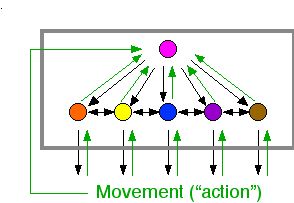

More on bipartite brain
Blindsight, cortical paralysis, dissociative fugue, skilled athletic performance
Dreaming, sleep walking, locked in syndrome
Relevant for thinking about constructedness of world but also of self: pain, phantom limb pain, confabulation
Interactions of cognitive unconscious (Marvin Minsky, Society of Mind) and story teller
Thoughts, feelings, aspirations not parallel to cognitive unconscious but rather derived from it
Emotion, intuition not distinct from thought but a part of it (Antonio Damasio, Descartes' Error)
Internal co-constructive dialogue/inquiry as well as external
Internal conflicts (weight control), added capabilities: to conceive beyond experience
![]()
Constructing a story of the world
- informed guessing and beyond
- some more examples
- and beyond
- creating meaning
- Implications for understanding "understanding"?
Constructing a story of the self and of one's relation to the world
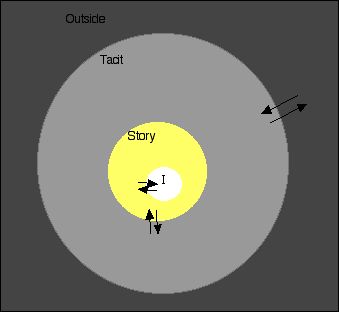 |
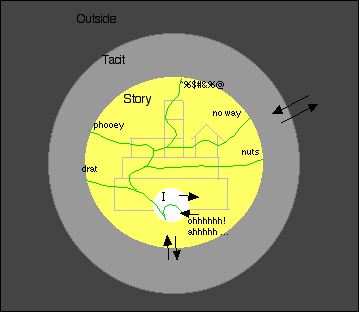 |
Loop 1 Empirical knowledge generated by conflicts with outside world
Loop 2 New understandings generated by internal conflicts
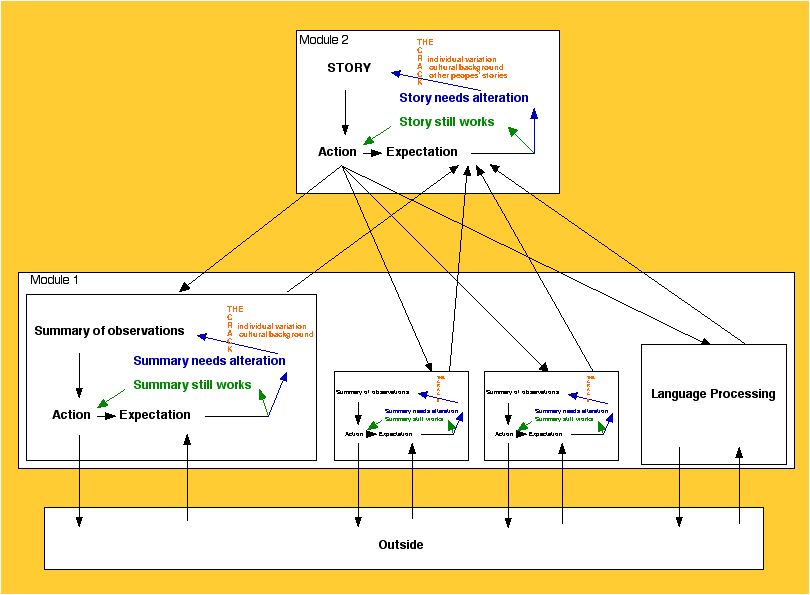
Revising the unconscious
 |
 |
Loop 3 Interpersonal relations, society/culture, morality: new understandings generated by conflicts between brains
- Culture as disability
- The emotional dog and it rational tail (click on title for .pdf after entering info)
- The moral life of babies
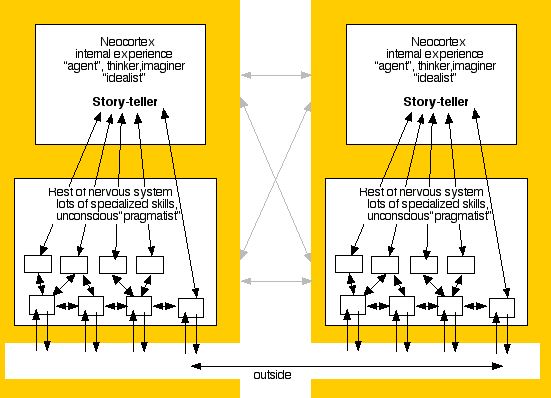
co-constructive inquiry
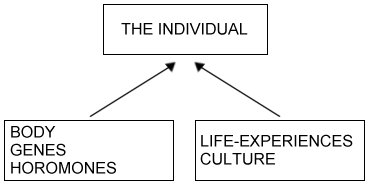 |
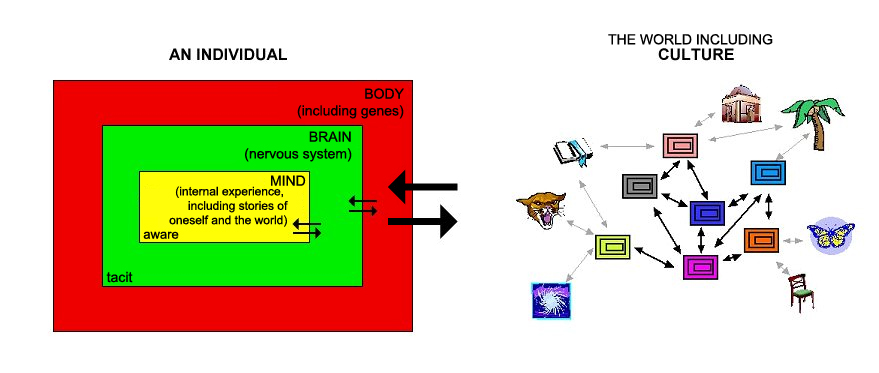 |
The brain uses three intersecting loops to detect conflicts/differences, uses them to create new ways of being, over and over again - The objective of education is to facilitate that ongoing process
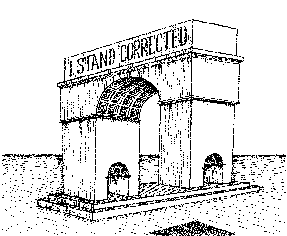
Roger Shephard
- Bertrand Russell (1872-1970) - Can we solve human problems rationally?
- Gregory Cantor (1845-1918) - There is no "everything"
- Kurt Gödel (1906-1978) - "There will always be unanswered questions." (Russell: the Incompleteness Theorem meant the end of a Dream ... written in Greek two and a half millenia ago"
- Ludwig Wittgenstein (1889-1951) "What we cannot speak of, we must pass over in silence ... The things that cannot be talked about logically are the only ones that are truly important."
- Nelson Goodman (1906-1998) "The answer to the question 'What is the way the world is? What are the ways the world is?' is not a shush, but a chatter."
|
Out beyond ideas of wrongdoing - Rumi (1207-1273) |
Your continuing thoughts about all this and its relation to the classroom in the forum below ....

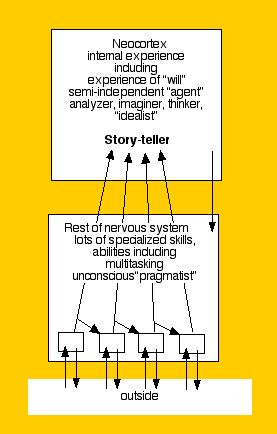



Comments
Culture
I think that culture contributes a lot to truth and truth a lot to culture. Looking over my notes from our previous class, I found a drawing of a loop connecting people<-->culture. Whether or not universal truths exist, local truths are heavily influenced by this interaction of people and culture. Since our culture is created by people, and since the brain is who we are, I think that the loops can be viewed to see how culture is constructed (as Angela touched on). Then we can look at cultural constructs to see truth. I guess that what I am saying is essentially in loop diagrams, but nonetheless this connection is quite interesting...not to mention loopy.
I thought the first part of
I thought the first part of class was particularly interesting when we couldn’t decide what kind, if at all, truths we were willing to accept. In fact, we couldn’t even what we wanted to call them and what we meant when you used words like “overarching truths”, “universal truths”, “global truths” and at the other end of spectrum, “local truths”, “personal truths” and “individual truths”. How would we feel about teaching these so-called “big” truths, only with the intent and purpose of deconstructing them? Because we need to have something to be skeptical about. If everyone was skeptical from the very beginning, would we have constructed something to deconstruct at all? Maybe that is what the purpose of such truths is - for us to challenge them to make our own stories.
Interpersonal Loop (3)
How is it that in the interpersonal loop (loop #3) there is a connection between two (or multiple) minds via the cognitive unconscious? I assume that in order for there to be an interaction between two or more individuals' cognitive unconscious it would have to be through the filter of their conscious in some form. If this interaction does in fact have to go through the conscious does that mean that the interaction between the individuals' cognitive unconscious is not in it's purest form due to the influence of the 'storyteller'?
mind to mind?
I also was thinking about this....
I thought that the loops would be:
(1) conscious <--> unconscious
(2) conscious <--> physical world
(3) unconscious <--> physical world
I just put other people/minds in the world category - isn't it impossible to interact or connect directly with another mind? Wouldn't other people be more like parts of the physical world in this sense?
What makes that scene great?
Regarding prof. Grobstein's story, I wonder if because the scene was the most memorable part of the movie for him when he was young, if he already had made a connection with that scene and, thus, when older it became easier for him to make a deeper connection with that scene, which allowed him to engage with it in a manner that we discussed would be ideal for a reader to engage with a text, and thus the scene became his favorite. If he hadn't particularly noted that scene when he was younger, would it be so powerful in the second viewing?
I'm feeling loopy...
I have been thinking about the story that Professor Grobstein told about watching a movie once and then again years later and the two experiences of the same event having different meanings. Immediately, I could think of a few events that I've had personally, such as reading books, where the passage of time and aggregation of experiences in the cognitive unconscious somehow changed my conscious (storyteller) recollection and interpretation of the same two events. I remember the second of the two times more fondly, but why?? How does that storyteller appeal to the conscious unconscious to trigger this change? Is it because the accumulation of experiences in my cognitive unconscious somehow bias my conscious' interpretation of future events? Is this as a result of the conflicts that arise between the the 1st and 2nd loops (Empirical knowledge generated by conflicts with outside world with New understandings generated by internal conflicts) and the opportunity for knowledge to accumulate and for critically thinking to occur? What about the 3rd loop (Interpersonal relations, society/culture, morality: new understandings generated by conflicts between brains)? This is where Prof. Grobstein telling the story of his memory of the scene in the movie affects my interpretation of the same scene and cause me to critically reflect on it, expanding my unconscious ability to recall these same experiences for the future. Apologies if this is stream of conscious (no pun intended), but I'm not sure that I precisely understand how the interactions between the loops affect how my ability to think critically changes with time (experiences).
Post new comment